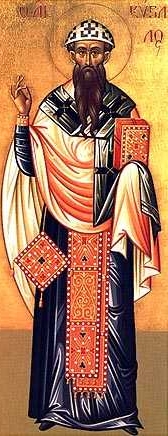There is very little that is known for sure about this Greek heroine as she lived so long ago, and those who have written her story are usually religiously biased. With this in mind, I intend to create an open minded version of this story, as I have no wish to misrepresent her.

The exact year of Hypatia's birth is unknown, though it is believed to have been between 350 and 370 AD. She grew up in Alexandria with her father, Theon, who was a mathematician. Alexandria was, at the time, a part of the Eastern Roman Empire, and home to Greeks, Romans, Jews and Christians. Christianity was on the rise, and there was much tension between religious groups. Women in these times were not as oppressed as some in other times, but it was still very unusual for women to achieve the status that Hypatia did. She was most likely educated by her father to become a great scholar, a teacher, and head of the Neoplatonic school in Alexandria.
 |
The burning of the Library of Alexandria
Illustration c.1910 |
Hypatia was a mathematician, an inventor, an astronomer and a philosopher. She was a considered a child prodigy, with an insatiable thirst for knowledge. She spent much of her childhood in the Great Library of Alexandria, which supposedly housed the world's greatest collection of papyrus scrolls, some of which were written by the greatest minds in the world. It is believed that the library was destroyed, along with all the other pagan temples, when paganism was outlawed in 391 AD. As the library existed long before there was such thing as a printing press, it did not contain books, but hand written scrolls. When the library was burned, the knowledge within it was lost forever. This would have been devastating for Hypatia and the other scholars of Alexandria, though the best of the information in the library was all contained in Hypatia's mind.
 |
Synesius attends the
lectures of Hypatia |
Hypatia was a firm believer in the Neoplatonic philosophy that she taught. No matter her own beliefs, she was happy to teach anyone who was willing to learn. She taught philosophy and astronomy and took on students of all cultures and faiths, and would even hold public lectures in the city centre for anyone who would listen. One of her students, Synesius, later became a Christian bishop, and incorporated Neoplatonic ideas in the Christian doctrine.
 |
| Orestes |
Another former student of Hypatia was Orestes, the prefect (governor) of Alexandria. Orestes apparently often sought Hypatia's counsel, and it is said she was held in high respect and had some influence with Oresetes' government. This was highly unusual for a woman. By all accounts, Hypatia was a very beautiful woman, but it was through the balance of confidence and humility that she is said to have commanded the respect of powerful men. Later Christian writers portrayed Hypatia as an evil seductress who had bewitched Orestes to do her bidding, but the account of Socrates Scholasticus (which was written closer to the time of Hypatia's death, and appears unbiased) describes her as a woman who had earned her influential position by her great 'dignity and virtue'. It is believed that she was unmarried, and remained a virgin, which would have been in line with her Platonic beliefs.
 |
| Bishop Cyril |
According to Scholasticus, Hypatia's friendship with Orestes proved fatal. Cyril, the Bishop of Alexandria, was working to flush the remaining Jews and Pagans out of the city, and though Orestes was a Christian man, he was more tolerant of those of other faiths and desired all to live peacefully in the city.Their feud came to a head in 415 AD, when fundamentalist Christian monks entered the city and began abusing Orestes, calling him a pagan and an idolater. Orestes protested, explaining that he was a baptised Christian, but his complaints fell on deaf ears. One of the monks threw a stone and hit Orestes in the head. The monk, named Ammonius, was captured and tortured, which resulted in his death. Cyril proclaimed him a martyr.
'So, what has all this to do with a pagan philosopher?' you may ask. Perhaps absolutely nothing. Nevertheless, rumours circulated that Hypatia was responsible for the irreconcilable differences between Cyril and Orestes. Hypatia was captured by a mob of Christian fanatics, taken to a church, and skinned alive with roof tiles. Her body was torn apart and burned.
 |
Hypatia, being dragged through the streets
of Alexandria by her murderers |
Scholasticus writes that the news of Hypatia's murder was met with outrage against Cyril and his followers. The scholars are said to have left Alexandria in disgust. Scholasticus, himself a Christian, lamented that the whole affair, including Hypatia's murder, was far from being in 'the spirit of Christianity'.
Some historians believe that along with Hypatia's death came the death of the age of Classical Antiquity, which was followed by an age of religion, blind faith and ignorance (sometimes referred to as the 'dark ages'). The sciences and philosophies Hypatia taught were all but forgotten until the Renaissance, when her legend was revived and she was revered as an intellectual heroine.
Hypatia has become a role model and idol for feminists, scientists, pagans and atheists. She has been recreated in many theatrical and literary works, even in modern times. In particular, she is revered for her unwavering strength of character and her readiness to stand up for her beliefs, for wisdom and reason.
Sources:
http://www.feministezine.com/feminist/philosophy/Hypatia.html
http://www.smithsonianmag.com/womens-history/hypatia-ancient-alexandrias-great-female-scholar-10942888/?no-ist=&page=2
https://en.wikipedia.org/wiki/Hypatia
https://en.wikipedia.org/wiki/Library_of_Alexandria



No comments:
Post a Comment